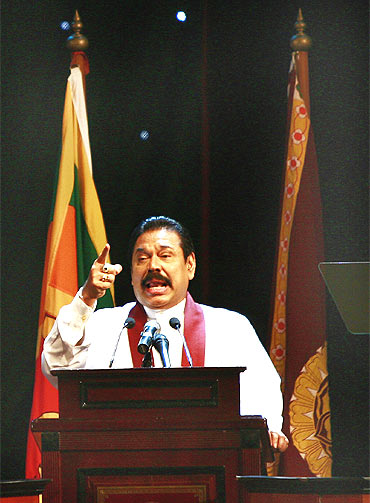 Sri Lankan President Mahinda Rajapaksa on Wednesday won a second term in office trouncing joint opposition candidate Sarath Fonseka, his one-time army chief who helped him crush the LTTE, and the loser cried foul rejecting the outcome.
Sri Lankan President Mahinda Rajapaksa on Wednesday won a second term in office trouncing joint opposition candidate Sarath Fonseka, his one-time army chief who helped him crush the LTTE, and the loser cried foul rejecting the outcome.
In dramatic events on a tension-filled day when scores of heavily-armed soldiers surrounded a lake-front luxury hotel in central Colombo, where 59-year-old Fonseka was staying, the former army chief spoke of seeking protection from "a neighbouring country", apparently India, fearing for his safety.
Government, however, dismissed suggestions of any foul play against Fonseka, who quit as army chief late last year following differences with the President, with both claiming credit for eliminating the Tamil Tigers.
In a bitterly-fought contest after the two war heroes fell apart, 64-year-old Rajapaksa secured 60,15,934 votes or 57.88 per cent of the total votes cast while Fonseka bagged 41,73,185 or 40.15 per cent, Election Commissioner Dayananda Dissanayake said in a press conference. There were 20 other candidates in the fray.
Rejecting the outcome of the polls, Fonseka said he would move the court against it. He also claimed threat to his life and said that he may leave the country for a short duration if required.
Fonseka accused the government of violating election rules and misleading people.
Military Spokesman Brigadier Udaya Nanayakkara said the troops had been deployed at the hotel, where Fonseka was staying, following information that suspected army deserters were among 400 people present inside.
"We don't know what is their motive... whether these are suspected army deserters providing security and whether they are associated with Gen (retd) Sarath Fonseka," Nanayakkara said.
Fonseka also wrote to the Election Commission demanding steps to ensure his security as he claimed that attempts were being made to arrest him, local media reported.
He said he had moved to the hotel as there were attempts to surround his office and arrest him, adding that 10 of his guards had been taken into custody.
Fonseka's camp said the 10 arrested men were part of the security contingent given to the opposition presidential candidate by Election Commissioner Dissanayake.
Mano Ganesan, a close aide of the former army chief, said "we want Sarath Fonseka safe."
"I am going to meet a diplomat of a neighbouring country to seek assurances of Fonseka's safety," Ganesan told PTI, apparently referring to India.
Thanking Sri lankan people for his win, Rajapaksa said he would continue with the current developmental policies to accelerate the progress of the country.
Rajapaksa said he humbly accepted the results of the presidential elections, describing his win as an "excellent victory and one that reflected the choice of the people."
The President said the result proved that the people had an awareness of the democratic process and asked the citizens to unite together to build the country.
Rajapaksa said the victory vindicated the trust in his policy that the people of the country were all equal and that he was now the President of the whole of Sri Lanka, including those who had not voted for him.
Rajapaksa's supporters came to the streets in many parts of the country bursting crackers to celebrate his victory. Observers attributed the victory of Rajapaksa to his success in eating into the vote bank share of the main Opposition United National Party and the Marxist JVP, which had strived to put up a united front.
Over 14.8 million voters were eligible to exercise their franchise in the polls. More than 68,000 police personnel and 25 army battalions had been deployed for the conduct of peaceful elections.
The elections were the first peacetime presidential vote since Tamil Tigers took up arms in 1972.
Rajapaksa had called the elections two years ahead of schedule in an apparent bid to cash in on the victory over the Tamil Tiger rebels.
Election monitors from international bodies observed the crucial polls, including 40 from Asian Election Monitoring Authority.
Image: Andrew Caballero-Reynolds/Reuters





